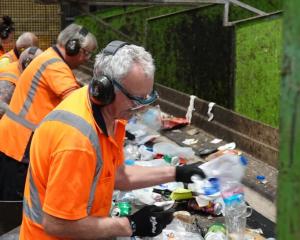
Last year the Labour Inspectorate alleged widespread exploitation and breaches of labour standards by one in every five of Chorus' subcontracted firms, whose workers were rolling out the ultra-fast broadband network nationwide.
It had since taken action against 42 of the 73 firms identified.
DO YOU KNOW MORE? EMAIL US |
Workplace Relations Minister Iain Lees-Galloway said at the time the behaviour was not acceptable, and that principal contractors like Chorus "must pay much closer attention to what's going on in their supply chains".
Chorus' own investigation, which included its service companies Visionstream and UCG, found another 33 subcontracted delivery partners had possibly breached standards, extending the scale of breaches to one-in-three firms.
A review by the corporate consulting firm MartinJenkins found Chorus' board did not act on concerns it received as early as 2016.
"We found, with the benefit of hindsight, that Chorus relied too heavily on a model whereby workforce risk, including the risk of migrant exploitation, was managed by the service companies without sufficient oversight," the report said.
"Chorus' consideration of strategic workforce risks was focussed on the steps required by its service companies to drive recruitment to meet the burgeoning demand for connections to fibre [broadband]."
As the network roll out ramped up, more migrants from India and the Phillipines with temporary work visas were recruited.
The report said they feared complaining about their labour standards would threaten their right to work in New Zealand.
"The quality of certain information that Chorus, Visionstream and UCG had about the workers contributing to the UFB Connect work programme was poor ... [including] about the status of different visa conditions under which workers were employed."
While Chorus was disappointed in itself and the breaches were mostly low level, there were no safeguards in place to prevent more breaches, the report said.
It recommended a handful of ways for Chorus to safeguard its subcontracted workers, including executives taking more accountability, more worker support and a better approach to risk management and the auditing of subcontractors.
Chorus' chief executive Kate McKenzie said the changes would be made.
"Chorus, Visionstream and UCG needed to step up what we were doing in order to identify and mitigate the risk of breaches in employment law, which can be very difficult to identify, particularly when working with migrants.
"We will make the necessary changes to ensure fairness in line with employment laws no matter where in the supply chain workers are contributing."
Comments
Having been a chorus sub contractor for a number of years - they will simply pass on the blame to UCG and Visionstream who will pass the blame on to the subcontractors.
I can say the current codes don't increase with inflation (over 4 years), and the whole risk of the job falls on to these small sub contractors,.
1/2 the code from chorus is taken by these middle companies who offer little value to the supply chain expect offer a degree of separation (for chorus) from events like this.
There is no money in the code for a return on assets, depreciation, down time.
In UFB 1, chorus was paid by Crown fibre holdings (Now crown infrastructure) to deliver a communal network to the boundary with little disruption to council infrastructure. We use to be able extra payments if any outside boundary work was required. Chorus changed the code to introduce a drop zone, which resulted in a whole lot of extra work for the sub contractors at no extra money.
Chorus was paid to do one thing, but pass the cost onto vulnerable sub contractors.
The service company's sell a dream, (At around 60k investment) and then you have to shut up, accept the terms and conditions or lose work.












